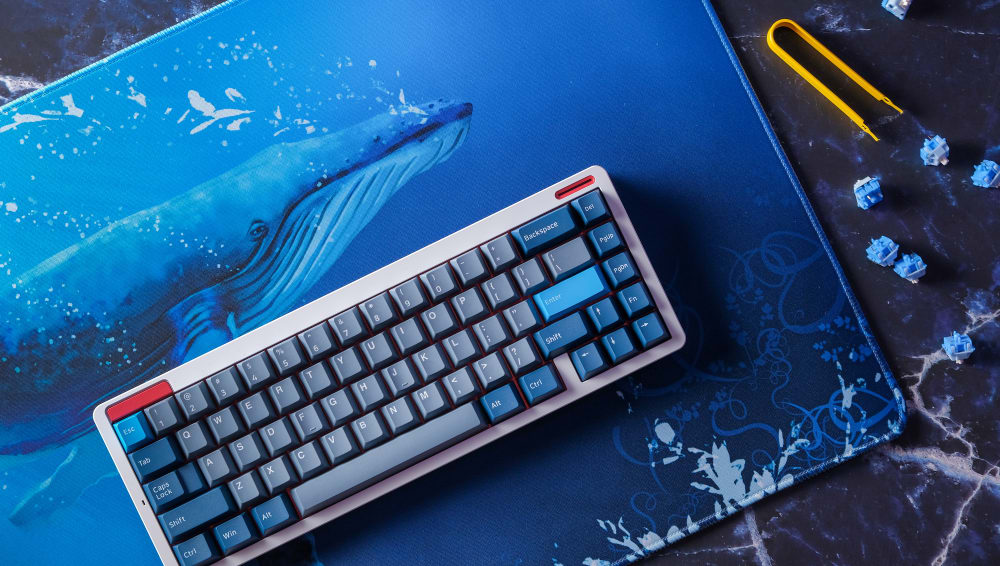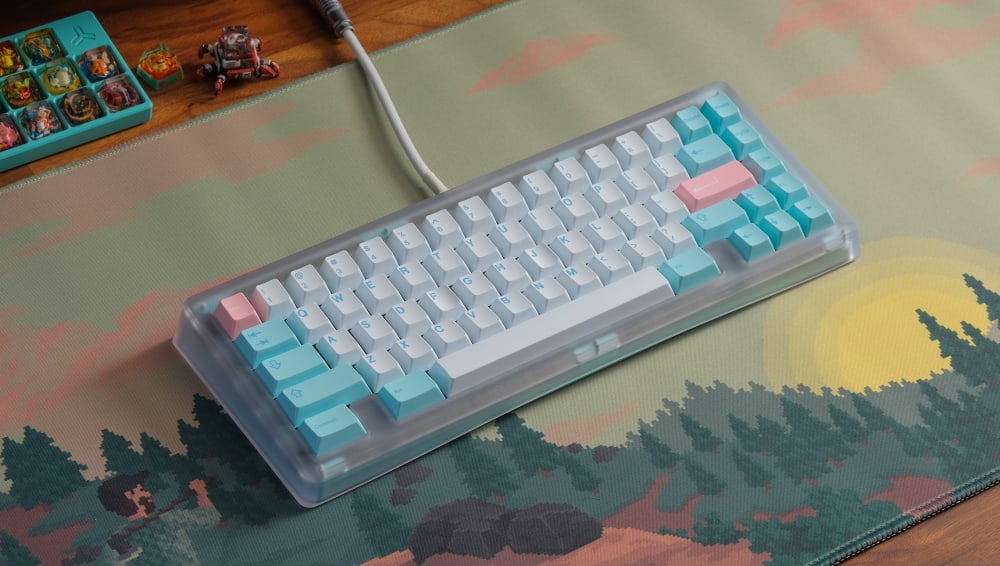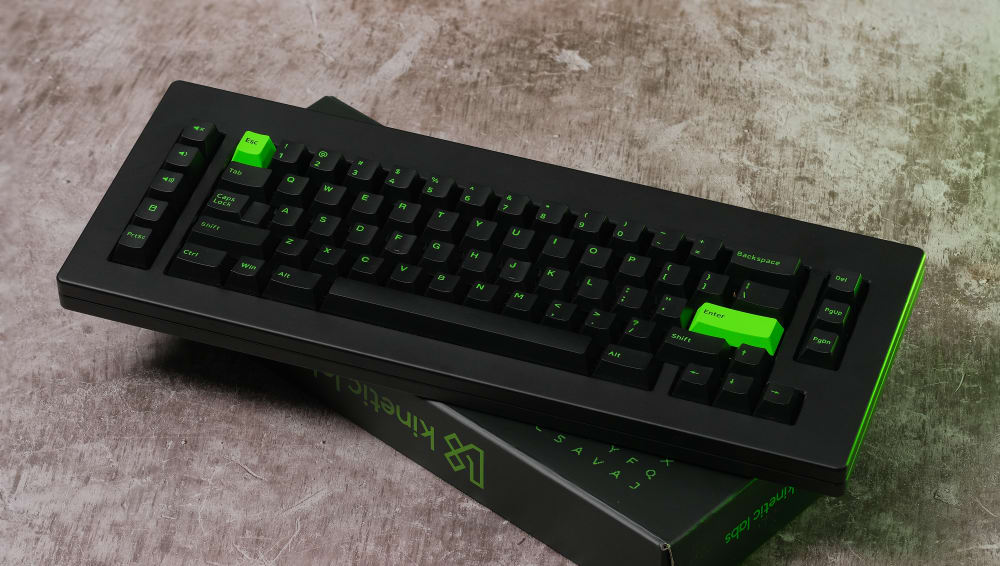Liam H.
Jul 13, 2022
•6 minutes
Should I buy ABS vs. PBT Keycaps?
As a relative newcomer to the hobby, I decided to take a deep dive into the pros and cons of ABS and PBT materials as they pertain to keycaps. In this post I share my findings.


PolyCaps Whale PBT Keycaps top down
Acrylonitrile Butadiene Styrene (ABS) and Polybutylene Terephthalate (PBT) are the two most common keycap materials. ABS keycaps are the more common of the two, while PBT keycaps are rarer and more expensive. However, the increased price is more than justified given PBT's increased durability and longevity.
Note the notable exception to this price rule is GMK, a German manufacturer of extremely high quality ABS keycaps, which are the most expensive in the market.
ABS Keycap Basics


ABS Keycaps on Sierra Desk Mat
ABS is a thermoplastic polymer with a low melting point, meaning that it melts down easily and can be remolded over and over again. This ease of recycling is a chief reason for ABS's popularity in most industries dependent on plastic — it's easy to recover potential losses from manufacturing errors, and it's easy to source ABS cheaply. Everything from children's toys to hard hats is made of ABS.
ABS is also, by far, the most common material for keycaps. Nearly every major computer manufacturer uses ABS keycaps, with PBT reserved for more high-end and niche machines. Most mass-produced keyboards use thin, cheap ABS keycaps, which are fine for most applications, but not the most long-lasting solution.
Pros of ABS Keycaps
Keycaps made from ABS don't shrink as much during the molding process as keycaps made using PBT, which makes them easier (and cheaper) to manufacture. In fact, ABS holds its shape so well that it's commonly used in PBT keycap sets for larger keys (like the spacebar). ABS also has a glossy appearance, strong dimensional stability, and solid insulating properties. Thanks to these features, ABS holds up well both functionally and cosmetically.
Cons of ABS Keycaps
There are limits to ABS's durability, however. ABS keycaps can scratch easily and, while they do insulate well, are still very flammable under extreme temperatures, and can melt at temperatures as low as 105 degrees Fahrenheit. ABS also yellows more quickly than PBT when exposed to UV light, either from lamps or the sun. You've probably seen the old off-white-to-beige keyboards of the late nineties. Those were all made with ABS keycaps, and the long hours they've spent in brightly-lit offices have, almost universally, precipitated a sickly yellow tint to their once-neutral tones.
The glossy sheen and soft, smooth feel of ABS may seem attractive at first but, over time, that smooth finish takes on a worn, greasy appearance. The tactile bumps on the F and J keys can also get worn down over time, and the letter labels themselves may rub off after just a few years if they were printed using dye sublimation, potentially rendering the keyboard unusable (or, at least, very difficult to use). The keycaps themselves can also thin — every time you slide your finger over the key, an imperceptible layer of the key rubs off. Over time, those tiny layers add up, and can noticeably thin the caps, reducing their durability. Thin key caps are especially likely to break when they're removed for cleaning or maintenance.
Some premium ABS keycaps are manufactured to be especially resistant to heat, impact, and yellowing, but even premium ABS keycaps underperform in these areas relative to PBT.
Basics of PBT Keycaps


PolyCaps Code PBT Keycaps
PBT plastic is also a type of thermoplastic but, unlike ABS, it has a semi-crystalline structure. It's strong and more heat resistant than ABS, and can be mixed with other materials in the manufacturing process to produce unique traits.
PBT is a more heavy-duty material, suitable for applications that require high heat resistance, chemical resistance, strength, or stiffness. PBT's very common in industrial applications and situations in which it may be exposed to high levels of heat or friction. It's more common that you'll find PBT inside a computer, where there's heat and electricity to contend with, than outside a computer.
Mechanical keyboard keycaps made from PBT are thicker, heavier, and stronger than ABS keycaps, leading to an overall improvement in durability and longevity.
Pros of PBT Keycaps
PBT keycaps are much hardier than ABS keycaps. They're more heat resistant, with a melting point of around 225 degrees Fahrenheit, and much less likely to yellow from exposure to UV light. They'll also hold up to tens — or even hundreds — of millions of key presses without displaying signs of wear. PBT keycaps have a sandy, textured, matte feel and appearance that keeps them from developing the greasy look and feel that's nearly universal among ABS keycaps. PBT keycaps are heavier than ABS keycaps and produce a more crisp sound, providing a smoother, more responsive typing experience.
They're also easier to clean and replace than their ABS counterparts, since they're less likely to snap or crack when pried from the keyboard itself.
Due to the durability of PBT, it's commonly used in the manufacture of double shot keycaps. Double shot keycaps are more difficult to make, and require a strong plastic in order to avoid manufacturing errors. First, two separate piece of plastic are made. Then, the letter label is placed or printed in between them, and they are molded together. That way, light can pass through the letter label, often to show off custom colored lighting. One added benefit of double shot keycaps is that your finger never makes direct contact with the letter labels, so they're not vulnerable to rubbing off.
Cons of PBT Keycaps
PBT is much more durable than ABS and, as a result, more expensive and difficult to mold. The increased difficulty in manufacturing PBT is the main reason for ABS's popularity over PBT in the current market. Most commercial keyboards just don't need to last all that long, and are often replaced with more modern keyboards before they've reached the true end of their functionality. It doesn't make sense for manufacturers (and consumers) to incur increased expense for a product they're not really going to put to the test. PBT is a truly industrial material, and often considered too expensive for non-industrial applications that won't take full advantage of its durability.
The Best Keyboard Keycaps
For mechanical keyboard enthusiasts, there isn't a better option than PBT. It doesn't just hold up to years of heavy use but, in many cases, decades. If you're shopping for custom keycaps for a mechanical keyboard, you care enough about the look and feel of your rig to invest in PBT keycaps that will continue to deliver a consistent experience for years to come.